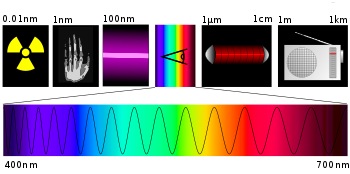மின்காந்த நிழற்பட்டை
இருக்ககூடிய அனைத்து மின்காந்த கதிர்வீச்சின் விபரிப்பே மின்காந்த நிழற்பட்டை (Electromagnetic spectrum) ஆகும். மின்காந்த கதிர்வீச்சுக்களை அதன் அலைநீளம் அல்லது அலையெண் கொண்டு விபரிக்கலாம். மின்காந்த நிழற்பட்டை நுண்ணிய அலைநீளத்தில் இருந்து மிக நீண்ட அலைநீள மின்காந்த கதிர்வீச்சுக்களை உள்ளடக்கும்.

- காம்மா அலைகள் (1010 - 1013 GHz)
- ஊடு கதிர் அலைகள் (108 - 109 GHz)
- புற ஊதா கதிர்கள் (106 - 108 GHz)
- ஒளி அலைகள் (105 - 106 GHz)
- அகச்சிவப்புக் கதிர்கள் (103 - 104 GHz)
- நுண்ணலைகள் (3 – 300 GHz)
- வானொலி அலைகள் (535 kHZ - 806 MHz)[1][2][3]
மேற்கோள்கள்
தொகு- ↑ Mehta, Akul (25 August 2011). "Introduction to the Electromagnetic Spectrum and Spectroscopy". Pharmaxchange.info. பார்க்கப்பட்ட நாள் 2011-11-08.
- ↑ "Herschel Discovers Infrared Light". Cool Cosmos Classroom activities. Archived from the original on 2012-02-25. பார்க்கப்பட்ட நாள் 4 March 2013.
He directed sunlight through a glass prism to create a spectrum [...] and then measured the temperature of each colour. [...] He found that the temperatures of the colours increased from the violet to the red part of the spectrum. [...] Herschel decided to measure the temperature just beyond the red of the spectrum in a region where no sunlight was visible. To his surprise, he found that this region had the highest temperature of all.
- ↑ Davidson, Michael W. "Johann Wilhelm Ritter (1776–1810)". The Florida State University. பார்க்கப்பட்ட நாள் 5 March 2013.
Ritter [...] hypothesized that there must also be invisible radiation beyond the violet end of the spectrum and commenced experiments to confirm his speculation. He began working with silver chloride, a substance decomposed by light, measuring the speed at which different colours of light broke it down. [...] Ritter [...] demonstrated that the fastest rate of decomposition occurred with radiation that could not be seen, but that existed in a region beyond the violet. Ritter initially referred to the new type of radiation as chemical rays, but the title of ultraviolet radiation eventually became the preferred term.